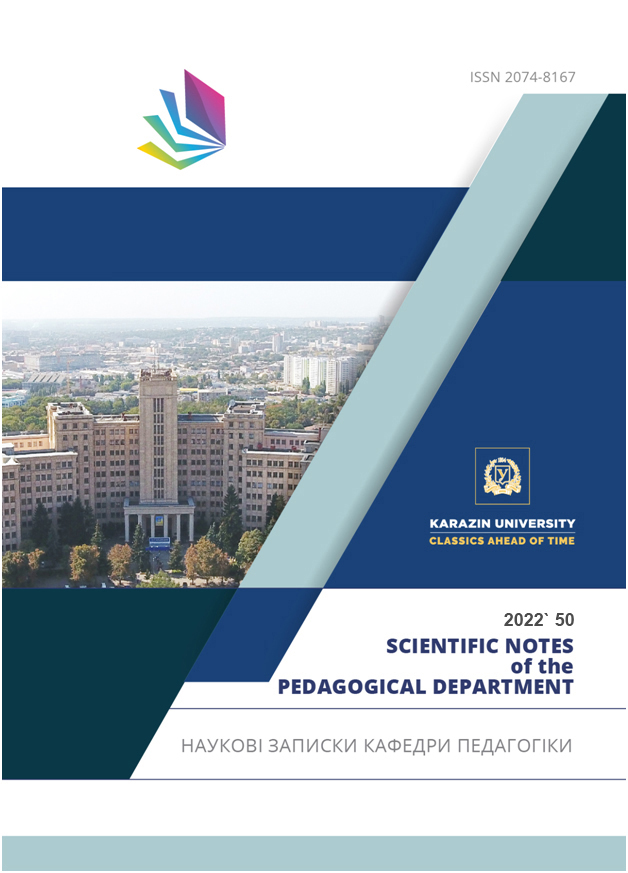Structural components of the competence of self-expression of the future teacher of music art in the context of the competence approach
Abstract
The article considers general issues of determining the competence of cultural self-expression in the context of training future teachers of music through the prism of various foreign scholars and researchers. The analysis of the structural elements of the competence of self-expression was based on the development of key competences for life for the citizens of the European Union. The research methods were determined by the analysis of open sources and research of organizations and individual scientists, systematization of the obtained results and their interpretation. The study proves that the competence of self-expression is the next stage in the constant evolution of competences in the field of culture and interpersonal interaction of people. Data on various definitions of competence in the field of cultural awareness and self-expression are given. The author analyzed the framework of descriptors that are inherent in music teachers in the European Union, the main of which are: personal self-development; development of musical abilities; management of the process of musical (self) development; management of non-formal music (self) education. The results obtained can be a valuable basis for scientists from China who will develop educational standards and competency frameworks for future music teachers. The author emphasizes the need to form the competence of self-expression as the highest stage of human development on the basis of creativity, intercultural understanding and awareness of their place in the world.
Downloads
References
/References
Barton, G. (2018). The relationship between music, culture, and society: meaning in music. In Music Learning and Teaching in Culturally and Socially Diverse Contexts (pp. 23-41). Palgrave Macmillan, Cham.
Burchum, J. (2002, October). Cultural competence: An evolutionary perspective. Nursing Forum, 37(4), p. 5.
Council Recommendation (2018). Key Competences for LifeLong Learning. Retrieved January 30, 2022, from https://eur-lex.europa.eu/legal-content/EN/TXT/?uri=CELEX%3A52018SC0014
Dong, X. (2009). Cultural Differences and Cultivation of Cross-Cultural Communicative Competence in Chinese FLT. International Education Studies, 2(2), 22-25.
European Communities. (2007). Key competences for lifelong learning: European reference framework.
Ho, W. C., & Law, W. W. (2004). Values, music and education in China. Music Education Research, 6(2), 149-167.
Ho, W. C. (2018). Culture, music education, and the Chinese dream in mainland China (Vol. 7). Singapore: Springer.
Ho, W. C., & Law, W. W. (2006). Students’ music experiences, society and culture: music education in Shanghai, China. Music Education Research, 8(1), 47-64.
Kirmayer, L. (2012). Rethinking cultural competence. Transcultural Psychiatry, 49(2), 149–164.
Lasauskienė, J., & Rauduvaitė, A. (2013). Designing Music Teacher Competences in the European Qualifications Framework. Procedia-Social and Behavioral Sciences, 83, 180-184. https://doi.org/10.1016/j.sbspro.2013.06.035
Martin, M., & Vaughn, B. (2007). Cultural competence: The nuts and bolts of diversity and inclusion. Strategic Diversity & Inclusion Management, 1(1), 31-38.
Şahin, M., Akbaşlı, S., & Yanpar Yelken, T. (2010). Key competences for lifelong learning: The case of prospective teachers. Educational Research and Review, 5(10), 545-556.
Sala, A., Punie, Y., Garkov, V. and Cabrera Giraldez, M. (2020). LifeComp: The European Framework for Personal, Social and Learning to Learn Key Competence, EUR 30246 EN, Publications Office of the European Union, Luxembourg, ISBN 978-92-76-19418-7, doi:10.2760/302967, JRC120911.
Watt, K., Abbott, P. & Reath, J. (2016). Developing cultural competence in general practitioners: an integrative review of the literature. BMC Fam Pract, 17, 158. https://doi.org/10.1186/s12875-016-0560-6
Barton, G. (2018). The relationship between music, culture, and society: meaning in music. In Music Learning and Teaching in Culturally and Socially Diverse Contexts (pp. 23-41). Palgrave Macmillan, Cham.
Burchum, J. (2002, October). Cultural competence: An evolutionary perspective. Nursing Forum, 37(4), p. 5.
Council Recommendation (2018). Key Competences for LifeLong Learning. Retrieved January 30, 2022, from https://eur-lex.europa.eu/legal-content/EN/TXT/?uri=CELEX%3A52018SC0014
Dong, X. (2009). Cultural Differences and Cultivation of Cross-Cultural Communicative Competence in Chinese FLT. International Education Studies, 2(2), 22-25.
European Communities. (2007). Key competences for lifelong learning: European reference framework.
Ho, W. C., & Law, W. W. (2004). Values, music and education in China. Music Education Research, 6(2), 149-167.
Ho, W. C. (2018). Culture, music education, and the Chinese dream in mainland China (Vol. 7). Singapore: Springer.
Ho, W. C., & Law, W. W. (2006). Students’ music experiences, society and culture: music education in Shanghai, China. Music Education Research, 8(1), 47-64.
Kirmayer, L. (2012). Rethinking cultural competence. Transcultural Psychiatry, 49(2), 149–164.
Lasauskienė, J., & Rauduvaitė, A. (2013). Designing Music Teacher Competences in the European Qualifications Framework. Procedia-Social and Behavioral Sciences, 83, 180-184. https://doi.org/10.1016/j.sbspro.2013.06.035
Martin, M., & Vaughn, B. (2007). Cultural competence: The nuts and bolts of diversity and inclusion. Strategic Diversity & Inclusion Management, 1(1), 31-38.
Şahin, M., Akbaşlı, S., & Yanpar Yelken, T. (2010). Key competences for lifelong learning: The case of prospective teachers. Educational Research and Review, 5(10), 545-556.
Sala, A., Punie, Y., Garkov, V. and Cabrera Giraldez, M. (2020). LifeComp: The European Framework for Personal, Social and Learning to Learn Key Competence, EUR 30246 EN, Publications Office of the European Union, Luxembourg, ISBN 978-92-76-19418-7, doi:10.2760/302967, JRC120911.
Watt, K., Abbott, P. & Reath, J. (2016). Developing cultural competence in general practitioners: an integrative review of the literature. BMC Fam Pract, 17, 158. https://doi.org/10.1186/s12875-016-0560-6
Citations
Development of student`s cultural awareness and self-expression in Chinese institutions of higher education
Nalyvaiko Nataliia & Nalyvaiko Oleksii (2023) The Scientific Notes of the Pedagogical Department
Crossref

